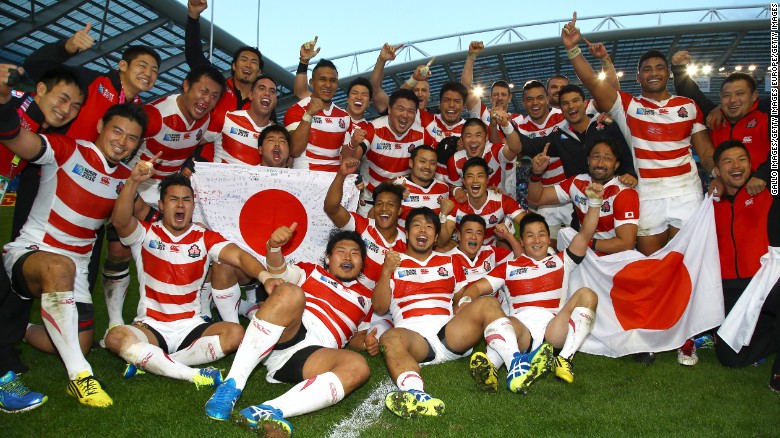Japan set to host ‘special’ World Cup as rugby steps into the unknown

New Zealand, Australia, South Africa, France and the UK have hosted the Rugby World Cup in the tournament’s 32-year history, but Friday’s curtain-raiser between Japan and Russia — the tournament’s first game on Asian soil — will mark a step into the unknown for the sport. The World Cup runs from September 20 to November 2 and will see 20 teams contest 48 games at 12 different venues. It’s the start of a year-long period in which Japan finds itself at the center of the sporting world’s gaze, with the rugby event a precursor to the 2020 Olympics. “I think the world can learn so much from Japan,” Michael Leitch, captain of the country’s rugby team, told CNN Sport earlier this year. “They’re so respectful in everything they do.”The past four years have seen Japan procure rugby pedigree, in no small part thanks to an astonishing victory over South Africa at the 2015 World Cup, widely considered the biggest shock the sport has ever seen. ]]]]>]]>Nowadays, the Brave Blossoms regularly go toe-to-toe with rugby’s familiar force, despite Japanese internationals having not yet been granted fully professional status. So how did the sport find a foothold in Japan? And what can we expect from a World Cup in Asia? READ: How Wales created a home-away-from-home in JapanJapan’s rugby boomLook at a map of established rugby-playing nations, and Japan stands on its own as the sport’s main Asian outpost. Rugby’s origins in the Far East date back to English influence in the late 19th century, and the sport began to grow through the 1900s thanks to universities and, later, big industries. Today, the Top League — Japan’s semiprofessional rugby league that supplies most of its international players — is comprised of corporate teams, specifically from iron, steel, auto-making, and manufacturing industries which employ the players.”If you’re a factory worker and doing eight-hour shifts, how do you then keep occupied in these compounds and how do you get physical exercise after working in quite arduous factory settings?” explains Helen Macnaughton, chair of the Japan Research Center at SOAS University of London.”When you think about where Japanese ideas on employment and teamworking have grown from, those core values of commitment and loyalty and inclusivity have been quite strong in corporate history in Japan … rugby’s growth definitely springs from that.”Players are recruited now, of course, for their sporting prowess, but because it’s semi-professional, they might still have a role in the company. It might just be a few hours a day, but then most of the time will be spent training.”A study conducted by YouGov in 2013 found that 21% of the Japanese population likes rugby, a figure not close to 70% in South Africa and 63% in New Zealand, but a significant fan base nonetheless which equates to 11 million people. Ticket sales for the World Cup have been healthy, with 85% of the 1.8 million available sold by the start of August. The prospect of rugby’s showpiece event being held in Japan has also piqued interest amongst foreign fans. It is expected that over 600,000 will descend for the tournament, and players have spoken highly of Japan as a rugby host. READ: Remembering Jonah Lomu, the gentle giant who changed rugby forever”One thing I can say is that the people are really welcoming, and the hospitality was awesome,” Italy international Sebastian Negri, who played two tests in Japan last year, recently told CNN Sport. “It was just good to experience a different culture. The World Cup’s going to be very, very special. It’s going to be done in a Japanese way, for sure, completely different. They’ll do it in their own way. But it’s really exciting, and I’m just buzzing to get over there.” ]]]]>]]>Culture clashThe country has been bracing for an influx of supporters. Bars and restaurants have been told by the organizing committee to stock up on beer, and resorts have considered relaxing their policies against displaying tattoos, which in Japan are associated with the Yakuza gangs. If history is anything to go by, then Japan has form of impeccable conduct at these kind of events. At last year’s FIFA World Cup, the national team won plaudits for leaving its changing room spotless, while fans also helped pick up litter from the stands after games. “The hospitality in Japan is the best in the world,” said Leitch. “You walk into a shop and they say hello and thank you — just the small things here make a difference.”They’ve got a great standard amongst society, and everyone abides by it. There are no written rules or anything like that, but, you know, there’s no rubbish bins here because everyone takes their rubbish home.”READ: From tattoos to hi-tech loos, your Rugby World Cup travel guide to JapanThe national team which Leitch has skippered for the past five years is an emblem of multiculturalism, hardly a typical snapshot of country with such a small immigrant population. Scan through the squad list and you’ll find players harking from New Zealand, Australia, Samoa, Fiji, Tonga, and South Africa.”From my personal perspective, I hope that [the team’s visibility during the World Cup] does encourage more open debate and a more open outlook on issues such as race inequality and immigration in Japan,” says Macnaughton. “Those are all social issues that have been bubbling under the surface in Japan and openly debated in Japan and South Korea for decades now — attitudes to race and attitudes to mixed race children, immigration, equality and inclusion. “I think if Japan can somehow leverage the Brave Blossoms to spark some debate about these very important issues, I think that would be a great thing.”Time to shineAs for Leitch, he’s seen his diverse team thrive on the world stage and break into the top 10 of World Rugby’s rankings for the first time. “There’s no special treatment towards this player or that player,” says the number eight, who himself has a Kiwi father and Fijian mother. “We all go out and we eat together, and we mix and mingle. There’s no separation, so I guess it’s accepting that this team is multicultural and just go with it.”‘);$vidEndSlate.removeClass(‘video__end-slate–inactive’).addClass(‘video__end-slate–active’);}};CNN.autoPlayVideoExist = (CNN.autoPlayVideoExist === true) ? true : false;var configObj = {thumb: ‘none’,video: ‘sports/2019/02/15/rugby-in-japan-cherry-blossoms-rise-up-world-cup-2019-south-africa-new-zealand-spt-intl.cnn’,width: ‘100%’,height: ‘100%’,section: ‘international’,profile: ‘expansion’,network: ‘cnn’,markupId: ‘body-text_44’,theoplayer: {allowNativeFullscreen: true},adsection: ‘edition.cnn.com_specialreports_rugbyworldcup_inpage’,frameWidth: ‘100%’,frameHeight: ‘100%’,posterImageOverride: {“mini”:{“width”:220,”type”:”jpg”,”uri”:”//cdn.cnn.com/cnnnext/dam/assets/190212155123-japan-rugby-world-cup-2015-tease-small-169.jpg”,”height”:124},”xsmall”:{“width”:307,”type”:”jpg”,”uri”:”//cdn.cnn.com/cnnnext/dam/assets/190212155123-japan-rugby-world-cup-2015-tease-medium-plus-169.jpg”,”height”:173},”small”:{“width”:460,”type”:”jpg”,”uri”:”//cdn.cnn.com/cnnnext/dam/assets/190212155123-japan-rugby-world-cup-2015-tease-large-169.jpg”,”height”:259},”medium”:{“width”:780,”type”:”jpg”,”uri”:”//cdn.cnn.com/cnnnext/dam/assets/190212155123-japan-rugby-world-cup-2015-tease-exlarge-169.jpg”,”height”:438},”large”:{“width”:1100,”type”:”jpg”,”uri”:”//cdn.cnn.com/cnnnext/dam/assets/190212155123-japan-rugby-world-cup-2015-tease-super-169.jpg”,”height”:619},”full16x9″:{“width”:1600,”type”:”jpg”,”uri”:”//cdn.cnn.com/cnnnext/dam/assets/190212155123-japan-rugby-world-cup-2015-tease-full-169.jpg”,”height”:900},”mini1x1″:{“width”:120,”type”:”jpg”,”uri”:”//cdn.cnn.com/cnnnext/dam/assets/190212155123-japan-rugby-world-cup-2015-tease-small-11.jpg”,”height”:120}}},autoStartVideo = false,isVideoReplayClicked = false,callbackObj,containerEl,currentVideoCollection = [],currentVideoCollectionId = ”,isLivePlayer = false,mediaMetadataCallbacks,mobilePinnedView = null,moveToNextTimeout,mutePlayerEnabled = false,nextVideoId = ”,nextVideoUrl = ”,turnOnFlashMessaging = false,videoPinner,videoEndSlateImpl;if (CNN.autoPlayVideoExist === false) {autoStartVideo = false;if (autoStartVideo === true) {if (turnOnFlashMessaging === true) {autoStartVideo = false;containerEl = jQuery(document.getElementById(configObj.markupId));CNN.VideoPlayer.showFlashSlate(containerEl);} else {CNN.autoPlayVideoExist = true;}}}configObj.autostart = CNN.Features.enableAutoplayBlock ? false : autoStartVideo;CNN.VideoPlayer.setPlayerProperties(configObj.markupId, autoStartVideo, isLivePlayer, isVideoReplayClicked, mutePlayerEnabled);CNN.VideoPlayer.setFirstVideoInCollection(currentVideoCollection, configObj.markupId);videoEndSlateImpl = new CNN.VideoEndSlate(‘body-text_44’);function findNextVideo(currentVideoId) {var i,vidObj;if (currentVideoId && jQuery.isArray(currentVideoCollection) && currentVideoCollection.length > 0) {for (i = 0; i 0) {videoEndSlateImpl.showEndSlateForContainer();if (mobilePinnedView) {mobilePinnedView.disable();}}}}callbackObj = {onPlayerReady: function (containerId) {var playerInstance,containerClassId = ‘#’ + containerId;CNN.VideoPlayer.handleInitialExpandableVideoState(containerId);CNN.VideoPlayer.handleAdOnCVPVisibilityChange(containerId, CNN.pageVis.isDocumentVisible());if (CNN.Features.enableMobileWebFloatingPlayer &&Modernizr &&(Modernizr.phone || Modernizr.mobile || Modernizr.tablet) &&CNN.VideoPlayer.getLibraryName(containerId) === ‘fave’ &&jQuery(containerClassId).parents(‘.js-pg-rail-tall__head’).length > 0 &&CNN.contentModel.pageType === ‘article’) {playerInstance = FAVE.player.getInstance(containerId);mobilePinnedView = new CNN.MobilePinnedView({element: jQuery(containerClassId),enabled: false,transition: CNN.MobileWebFloatingPlayer.transition,onPin: function () {playerInstance.hideUI();},onUnpin: function () {playerInstance.showUI();},onPlayerClick: function () {if (mobilePinnedView) {playerInstance.enterFullscreen();playerInstance.showUI();}},onDismiss: function() {CNN.Videx.mobile.pinnedPlayer.disable();playerInstance.pause();}});/* Storing pinned view on CNN.Videx.mobile.pinnedPlayer So that all players can see the single pinned player */CNN.Videx = CNN.Videx || {};CNN.Videx.mobile = CNN.Videx.mobile || {};CNN.Videx.mobile.pinnedPlayer = mobilePinnedView;}if (Modernizr && !Modernizr.phone && !Modernizr.mobile && !Modernizr.tablet) {if (jQuery(containerClassId).parents(‘.js-pg-rail-tall__head’).length) {videoPinner = new CNN.VideoPinner(containerClassId);videoPinner.init();} else {CNN.VideoPlayer.hideThumbnail(containerId);}}},onContentEntryLoad: function(containerId, playerId, contentid, isQueue) {CNN.VideoPlayer.showSpinner(containerId);},onContentPause: function (containerId, playerId, videoId, paused) {if (mobilePinnedView) {CNN.VideoPlayer.handleMobilePinnedPlayerStates(containerId, paused);}},onContentMetadata: function (containerId, playerId, metadata, contentId, duration, width, height) {var endSlateLen = jQuery(document.getElementById(containerId)).parent().find(‘.js-video__end-slate’).eq(0).length;CNN.VideoSourceUtils.updateSource(containerId, metadata);if (endSlateLen > 0) {videoEndSlateImpl.fetchAndShowRecommendedVideos(metadata);}},onAdPlay: function (containerId, cvpId, token, mode, id, duration, blockId, adType) {/* Dismissing the pinnedPlayer if another video players plays an Ad */CNN.VideoPlayer.dismissMobilePinnedPlayer(containerId);clearTimeout(moveToNextTimeout);CNN.VideoPlayer.hideSpinner(containerId);if (Modernizr && !Modernizr.phone && !Modernizr.mobile && !Modernizr.tablet) {if (typeof videoPinner !== ‘undefined’ && videoPinner !== null) {videoPinner.setIsPlaying(true);videoPinner.animateDown();}}},onAdPause: function (containerId, playerId, token, mode, id, duration, blockId, adType, instance, isAdPause) {if (mobilePinnedView) {CNN.VideoPlayer.handleMobilePinnedPlayerStates(containerId, isAdPause);}},onTrackingFullscreen: function (containerId, PlayerId, dataObj) {CNN.VideoPlayer.handleFullscreenChange(containerId, dataObj);if (mobilePinnedView &&typeof dataObj === ‘object’ &&FAVE.Utils.os === ‘iOS’ && !dataObj.fullscreen) {jQuery(document).scrollTop(mobilePinnedView.getScrollPosition());playerInstance.hideUI();}},onContentPlay: function (containerId, cvpId, event) {var playerInstance,prevVideoId;if (CNN.companion && typeof CNN.companion.updateCompanionLayout === ‘function’) {CNN.companion.updateCompanionLayout(‘restoreEpicAds’);}clearTimeout(moveToNextTimeout);CNN.VideoPlayer.hideSpinner(containerId);if (Modernizr && !Modernizr.phone && !Modernizr.mobile && !Modernizr.tablet) {if (typeof videoPinner !== ‘undefined’ && videoPinner !== null) {videoPinner.setIsPlaying(true);videoPinner.animateDown();}}},onContentReplayRequest: function (containerId, cvpId, contentId) {if (Modernizr && !Modernizr.phone && !Modernizr.mobile && !Modernizr.tablet) {if (typeof videoPinner !== ‘undefined’ && videoPinner !== null) {videoPinner.setIsPlaying(true);var $endSlate = jQuery(document.getElementById(containerId)).parent().find(‘.js-video__end-slate’).eq(0);if ($endSlate.length > 0) {$endSlate.removeClass(‘video__end-slate–active’).addClass(‘video__end-slate–inactive’);}}}},onContentBegin: function (containerId, cvpId, contentId) {if (mobilePinnedView) {mobilePinnedView.enable();}/* Dismissing the pinnedPlayer if another video players plays a video. */CNN.VideoPlayer.dismissMobilePinnedPlayer(containerId);CNN.VideoPlayer.mutePlayer(containerId);if (CNN.companion && typeof CNN.companion.updateCompanionLayout === ‘function’) {CNN.companion.updateCompanionLayout(‘removeEpicAds’);}CNN.VideoPlayer.hideSpinner(containerId);clearTimeout(moveToNextTimeout);CNN.VideoSourceUtils.clearSource(containerId);jQuery(document).triggerVideoContentStarted();},onContentComplete: function (containerId, cvpId, contentId) {if (CNN.companion && typeof CNN.companion.updateCompanionLayout === ‘function’) {CNN.companion.updateCompanionLayout(‘restoreFreewheel’);}navigateToNextVideo(contentId, containerId);},onContentEnd: function (containerId, cvpId, contentId) {if (Modernizr && !Modernizr.phone && !Modernizr.mobile && !Modernizr.tablet) {if (typeof videoPinner !== ‘undefined’ && videoPinner !== null) {videoPinner.setIsPlaying(false);}}},onCVPVisibilityChange: function (containerId, cvpId, visible) {CNN.VideoPlayer.handleAdOnCVPVisibilityChange(containerId, visible);}};if (typeof configObj.context !== ‘string’ || configObj.context.length 0) {configObj.adsection = window.ssid;}CNN.autoPlayVideoExist = (CNN.autoPlayVideoExist === true) ? true : false;CNN.VideoPlayer.getLibrary(configObj, callbackObj, isLivePlayer);});CNN.INJECTOR.scriptComplete(‘videodemanddust’);The national team’s amateur status means financial rewards for players are negligible. Coach Jamie Joseph revealed last year that home-based players were earning just £13 ($16) per day while on tour in Europe, while professional, foreign-based players weren’t getting paid at all. England — one of Japan’s opponents on the tour — reportedly pays its players $31,000 per game. What drives the players to compete at an international level, said Joseph, is a desire to play against the world’s best teams at the world’s biggest rugby venues.READ: How the Rugby World Cup has brought hope to one Japanese cityAnd now that opportunity is coming to their doorstep. In a pool alongside Scotland, Ireland, Russia and Samoa — and with an army of home fans behind them — the Brave Blossoms have their best ever chance of progressing to the knockout stages of the World Cup for the first time.







